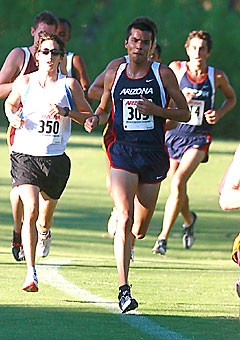For most collegiate athletes, once their NCAA eligibility is used up they head out into society hoping to make an impact in a field other than sports. Like the commercials say.
But not Eric Chavez. Not yet, anyway.
Chavez, who lettered in both track and cross country at Arizona, has returned to the cross country team this season as an undergraduate assistant.
Chavez improved dramatically during the 2005 season and consistently finished in the top five for the Wildcats last season.
At first, Chavez didn’t think that his dramatic change in roles would have a major impact on him.
“”I thought I would be fine not running competitively,”” Chavez said. “”But I was wrong. It really hit me when we went to Flagstaff (on Sept. 1). Seeing the guys warming up and getting ready to race was pretty hard. That was when it hit me that I was done and my time was up.
“”I still run with the guys,”” he added. “”I’m not in as good of shape as them, obviously, but I still run with them and help out with workouts.””
Even though he’s no longer competing for the Wildcats, UA head track coach Fred Harvey said that Chavez is still an asset to the program.
“”Eric Chavez has helped us out tremendously,”” Harvey said. “”He has really helped serve as a mentor for our young athletes.””
While the coaches may see Chavez as a mentor, he and the athletes he works with see him as their brother.
“”It’s hard because the team is like your family,”” Chavez said. “”These guys and girls are like my brothers and sisters, and you just build that special bond with them because you are with them so much. It’s pretty hard to know that (my college career) is over, but I am starting to accept my new role on the team.””
With the abundance of youth on this year’s team, perhaps a big brother is just what the team needs.
Spencer Carter, one of 10 freshmen, said he thinks that Chavez’s presence has a different impact on the athletes than the coaches do.
“”He’s more of a brother than a yell-in-your-face coach,”” Carter said. “”But at the same time, he’s really serious and really motivates you. You really respect what he says because he’s done it before. And as a coach he knows firsthand what the students are going through.””
Chavez said he likes to think that he has a special impact on the team, because he’s been through it all before.
“”And I want them to know that I’m here for them to talk to and that I want to help them get better,”” he said.
Chavez, who plans to graduate in December with a degree in regional development, had never really thought about coaching until this opportunity arose.
“”I don’t really know what the future holds,”” he said. “”Right now I’m just trying to get these guys ready for NCAA Division-I cross country because these teams are tough.””









